Now that ChatGPT is widely available, there have been concerns raised from educators that students are using this generative AI to do their assignments for them. This has been deemed “cheating” and instructors have been searching for tools to identify AI-generated content.
Is it actually cheating?
So first off, let’s consider if using ChatGPT is truly cheating. To do this, I think we need to distinguish the different ways students can use this generative AI to create content for their assignments. Similar to how students have used the Google search engine for years, there is a slippery slope between research on one end and outright plagarism on the other end.
Plagarism: “Presenting work or ideas from another source as your own, with or without consent of the original author, by incorporating it into your work without full acknowledgement.” - definition from University of Oxford
Oxford recently updated the definiton to include: “All published and unpublished material, whether in manuscript, printed or electronic form, is covered under this definition, as is the use of material generated wholly or in part through use of artificial intelligence (save when use of AI for assessment has received prior authorisation e.g. as a reasonable adjustment for a student’s disability).”
Do take the time to read Oxford’s “Forms of Plagarism” section. It’s clear that “Verbatim” copying of text without attribution is cheating. However, drawing the line on “Paraphrasing” becomes more difficult. What is ChatGPT doing execept summarizing a massive corpus of online human knowledge when it generates content? How do we cite ChatGPT’s primary sources?
In the end, I think using ChatGPT to research a topic, as if asking a knowledgable colleague for directions to investigate further, is not plagarism. On the other hand, prompting for an essay to simply copy verbatim is wrong.

Alright, how to identify cheaters?
One of the best known “identifiers” of AI-generated content is TurnitIn. Educators can paste text into the TurnitIn system and a percentage confidence will be output, indicating likelihood that AI generated it. I wasn’t able to try out this service, as one needs to subscribe. However, they have some images on their site if you’re interested.
Another site, ZeroGPT did successfully flag my exact copy/pasted essay:

A key question is how accurate such an identification system in the face of paraphrasing… in particular how often are false positives flagged? Leave alone the question of what sanctions an educational institution will apply in a suspected case. This is clearly a difficult challenge to apply a fair system across all students.
How do cheaters avoid detection?
As this discussion on Reddit showed, it is possible to tweak AI-generated content to minimize detection. In particular, asking for shorter sentences, using the playground mode, and heavily editing and changing the text can decrease the detection percentage.
However, a cheater, by definition is lazy. They don’t want to put in the effort to do the work properly themselves. So one needs to ask whether all the effort a cheater might apply to avoid detection, would not simply be better spent in organizing their own thoughts, properly researching the topic, and attributing all sources.
Conclusion
Given that plagarism exists on a spectrum, it’s clear that identifying cheaters is becoming harder and harder with generative AI tools these days. As editing copied content was used in past years to avoid detection, now one can simply tweak their ChatGPT prompts to minimize detection. Much like in-person math tests without calculators, limiting an exam on writing to an in-person situation can help, but greatly limits the type of writing being validated.
At a higher level though, why do we write? To organize our thoughts and effectively communicate them with others. When looked at from that viewpoint, plagarism is really a means of cheating yourself out of the skills to succeed in the future. One day, you’ll be in a work place situation where an organized thought process will be needed and faking it isn’t a possibility. That’s when you’ll wish you hadn’t cheated yourself out of much needed practice.
Update
Here’s an excellent comment from Reddit for students who wish to avoid being incorrectly fingered for plagarism:
- Work on Google Docs so that you have version histories saved and can prove your process, including all edits.
- If accused, request to be verbally pop-quizzed on the material.
- Show your prof articles from credible sources about the flaws in these AI checkers.
- Show your prof FAQ pages of the AI checkers themselves, which state not to use these tools for consequential purposes.
More in this series…
- ChatGPT - A new generative language model
- ChatGPT Prompts - Effective prompts for ChatGPT